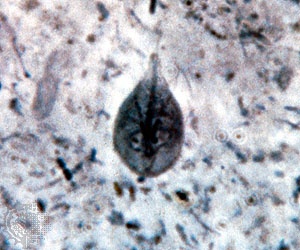Giardia lamblia
parasite
also called G. intestinalis
 single-celled parasite of the order Diplomonadida. Like those of other diplomonads (diplomonad), the cells of G. lamblia have two nuclei and eight flagella. The parasite attaches to human intestinal mucosa (mucous membrane) with a sucking organ, causing the diahrreal condition known as giardiasis. Acute giardiasis is a common disease among hikers, campers, and travelers to undeveloped countries who drink untreated water, and it is also quite common among children in day-care centres and people who use crowded public swimming areas. The clinical symptoms include large, foul-smelling, fatty stools, stomach cramps, and bloating. The parasite is passed directly from the stools of infected people or animals to persons who ingest infected water, food, or other material. Symptoms appear after a 10-day incubation period and may persist for weeks. The disease is generally mild and self-limiting, though infected children can develop chronic malabsorption of nutrients from the intestines. It is treated with antimicrobial drugs and with fluids to prevent dehydration.
single-celled parasite of the order Diplomonadida. Like those of other diplomonads (diplomonad), the cells of G. lamblia have two nuclei and eight flagella. The parasite attaches to human intestinal mucosa (mucous membrane) with a sucking organ, causing the diahrreal condition known as giardiasis. Acute giardiasis is a common disease among hikers, campers, and travelers to undeveloped countries who drink untreated water, and it is also quite common among children in day-care centres and people who use crowded public swimming areas. The clinical symptoms include large, foul-smelling, fatty stools, stomach cramps, and bloating. The parasite is passed directly from the stools of infected people or animals to persons who ingest infected water, food, or other material. Symptoms appear after a 10-day incubation period and may persist for weeks. The disease is generally mild and self-limiting, though infected children can develop chronic malabsorption of nutrients from the intestines. It is treated with antimicrobial drugs and with fluids to prevent dehydration.- Vandross, Luther
- Van Duyn, Mona
- Van Dyck, Sir Anthony
- Van Dyke, Henry
- Vane, Sir Henry, The Elder
- Vane, Sir Henry, the Younger
- Vane, Sir John Robert
- Vanessa Redgrave
- Vane, Sutton
- Van Fleet, James Alward
- vanga-shrike
- van Gennip, Yvonne
- Van Gogh Museum
- Vanguard
- Vanguardia Española, La
- Van Halen
- Van Heusen, Jimmy
- Van Horne, Sir William Cornelius
- vanilla
- Vanimo
- Vanir
- vanitas
- Van Kleeck, Mary Abby
- Van, Lake
- Van Lerberghe, Charles